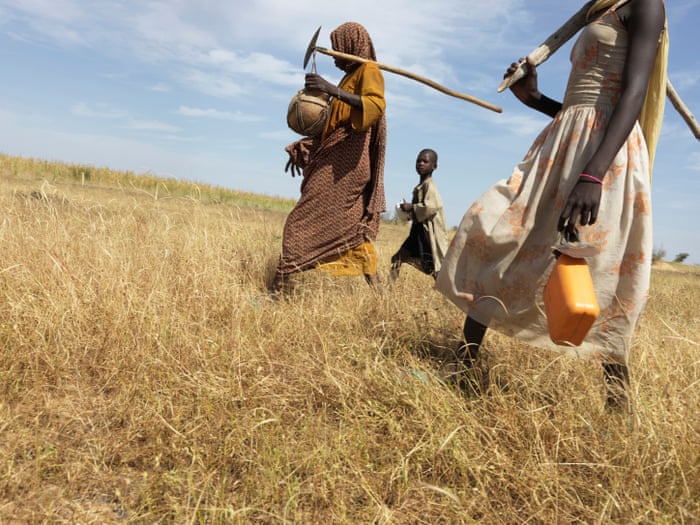

When the crops fail after drought in Chad, as happened this year, people are driven to hunt for wild grain and fruit to survive famine, as here in 2016.


When the crops fail after drought in Chad, as happened this year, people are driven to hunt for wild grain and fruit to survive famine, as here in 2016.
Chad, in the middle of Africa, is a landlocked country with 16 million people. It is one of the three poorest countries in the world according to the U.N., with the lowest life expectancy (54 years).
With nearly half a million refugees living within its borders, Chad passed a 2021 law granting all these refugees the right to work, to move freely in the country and to access health care, education and justice. Chad was implementing its pledge at the Global Refugee Forum, held by the U.N. in December 2019.
As a point of comparison, the U.S. admitted slightly over 11,000 refugees in fiscal year 2021, with none of the above rights guaranteed.
Chad, Burkina Faso, Mali, Mauritania and Niger make up the G5 Sahel, a group which France set up in 2014 to disguise and justify its military intervention in West Africa and to hide how France intended to maintain its hold on these former colonies.
Currently, hunger in the Sahel is overshadowing the military priorities that France and its ally, the United States, want to impose there. The U.S. has set up the world’s largest drone base in Niger.
Over 18 million people in the Sahel are facing starvation. A third of Chad’s people are in urgent need of food aid.
The government of Chad officially declared a “food emergency” June 1. The head of the ruling Transitional Military Council, Mahamat Idriss Déby Itno, called on “all national and international partners to help the people” and cited “constant deterioration of the food and nutritional situation and a growing risk” of food scarcity. (africanews.com, June 3)
The big business press in the European Union, the U.S. and England tries to present the growing threat of an African famine — defined as people other than infants dying from hunger — as resulting solely from Russia’s actions in the Ukraine conflict. The African press points instead to the effects of local insurgencies, the devastating drought, reinforced by global warming, and COVID-19.
The U.N.’s Food and Agriculture Organization has held to its position that global production of wheat will be slightly higher in 2022 than last year. The majority of the traditional wheat supply for West and North Africa comes from Ukraine and Russia. This trade has been seriously disrupted by the war. The question is who is behind the disruption.
Leaders of African Union meet with Putin
At a high-level meeting with Russian President Vladimir Putin on June 3 were Macky Sall, chair of the African Union and president of Senegal, along with Moussa Faki Mahamat, chair of the AU Commission, a former prime minister of Chad.
Sall and Mahamat both appealed to Putin to release the Ukrainian grain that is held up by a blockade Russia has established on Ukraine’s Black Sea ports. Mahamat released a tweet saying: “We appealed for the suspension of sanctions against cereals & other key commodities, the need for their safe sea passage to mitigate the devastating economic & socio-economic effects of a growing food & energy crisis.”
“President Putin has expressed to us his willingness to facilitate the export of Ukrainian cereals,” Sall tweeted. He added, “Russia was also ready to ensure the export of its own wheat and fertilizer.”
However, Russia lifting its blockade, which Putin appears willing to do, will not by itself get the grain-loaded ships moving out of Ukrainian ports. The government of Ukraine would still need to give permission for the ships to sail, and that same government would have to remove the mines it has placed to block ship movement on its southern coast.
The most deadly factor working against African Union appeals for help against the famine is the fact that the U.S. has actually placed sanctions on Russia to keep it from shipping the wheat and fertilizer it normally supplies to West Africa. The U.S. is charging Russia with stealing “Ukrainian” grain, even though the ownership status of the millions of tons of grain stored in southern and eastern Ukraine is unclear.
The U.S. and European bourgeoisie — who are cooperating to a degree in the sanctions directed against Russia — pretend that the impact of sanctions is limited to Russia alone. But many countries throughout the world are severely injured by the imposition of U.S. sanctions, including those against Russia.
The millions facing a shortage of wheat and starvation in Chad are among those suffering. In the current proxy war by the U.S., these millions are simply “collateral damage” in its drive for economic and military domination. If the food needed to avert famine starts to flow from Russia to West Africa, the U.S. campaign against Russia will lose a big propaganda point.
The epic struggle of the Palestinian people against the full weight of U.S. imperialism and…
The following report comes from the Bronx Anti-War Coalition organizers on a protest held in…
In the Canadian federal elections held on April 28, the Liberals won with 169 seats…
The following is Part 2 of a talk given by the author to a meeting…
Boston Students, professors and workers are confronting the Trump administration’s fascist crackdown at universities across…
Philadelphia Within days of Swarthmore students reviving a pro-Palestinian encampment on April 30, police arrested…